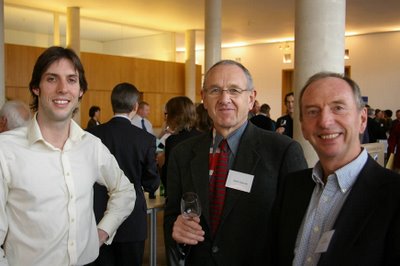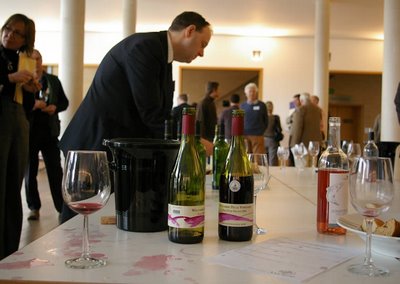A symposium: UK wine and Pinot Noir
 Just on the way home from a very interesting day, spent at the UK Vineyards Association Symposium, held in Oxford. Pictured above, right to left, Sam Lindo (Camel Valley, a speaker), Stephen Skelton MW (speaker) and Bob Lindo (who chaired proceedings).
Just on the way home from a very interesting day, spent at the UK Vineyards Association Symposium, held in Oxford. Pictured above, right to left, Sam Lindo (Camel Valley, a speaker), Stephen Skelton MW (speaker) and Bob Lindo (who chaired proceedings).I’d been asked to give a talk. I'm always a bit embarassed by such invitations, because (1) what do I know?; and (2) there'll always be people in the audience who know more than me. But I invariably agree, because I quite enjoy doing talks. My chosen title was ‘Natural wine’: does it mean anything, and how can wine science help? Pretty broad in scope, and more than a little conceptual, my main point was that all wine is effectively natural, but we’ve allowed the naturalness agenda to be snatched by a fringe. We need to claim it back, and make good use of wine science (for example, by employing integrated farming/IPM) so that we can be sustainable and environmentally friendly in all that we do as an industry. We need to let people know that wine is a natural product, but first we need to make sure our own house is in order.
The symposium itself was well attended. The first paper was by Dr Steve Charters MW, and it looked at the way Champagne is marketed. Champagne has succeeded because it is a clearly defined, well defended territorial brand managed by the CIVC. It has a long-term marketing vision, and an outward-looking perspective. It offers substantial added value, with successful positioning as a luxury product and a clearly defined story. And it has a continuing commitment to quality.
The next paper was by Robin Manning from DEFRA. It described the recent EU Wine Reform, and its implications for UK producers. Basically, UK wine has done well: chaptalization is still allowed (it was going to be banned) and the UK industry is exempt from the planting rights issue which was threatening to stop any new vineyard development. This is hugely important for the UK industry. As an aside, the planting rights ruling is due to finish in Europe in 2015, when anyone who wants to can then plant a vineyard where they want to. Makes sense, because the current situation stifles innovation.
After a ‘networking lunch’, Stephen Skelton MW gave a personal overview of the Pinot Noir variety in all its complexity and clonal diversity. Stephen has millions of years of experience working in the English wine industry, and so he’s well placed to give perspective on how things are developing. This was followed by a Pinot Noir tasting, which included a range of English still and sparkling wines, as well as a few international Pinots by way of benchmarking. The English wines performed well, I thought.
 We then had a presentation by David Clark, an ex-motor racing engineer (Williams F1 team) who spent a year at enology school in Burgundy and then bought a vineyard there. He gave a solid presentation on viticulture and winemaking in Burgundy, although (and this isn’t meant as a criticism) I was left wanting to hear a bit more about his own experience. What’s interesting about David’s venture is that he’s started with rather humble vineyards, which he manages as if they were much more serious vineyards. For example, his Bourgogne Pinot Noir vineyard is cropped at Grand Cru levels (35 hl/ha, but remember there are 9000-13 000 vines/hectare here) as opposed to the normal 80 hl/ha. His wines are carried by Berry Bros & Rudd in the UK.
We then had a presentation by David Clark, an ex-motor racing engineer (Williams F1 team) who spent a year at enology school in Burgundy and then bought a vineyard there. He gave a solid presentation on viticulture and winemaking in Burgundy, although (and this isn’t meant as a criticism) I was left wanting to hear a bit more about his own experience. What’s interesting about David’s venture is that he’s started with rather humble vineyards, which he manages as if they were much more serious vineyards. For example, his Bourgogne Pinot Noir vineyard is cropped at Grand Cru levels (35 hl/ha, but remember there are 9000-13 000 vines/hectare here) as opposed to the normal 80 hl/ha. His wines are carried by Berry Bros & Rudd in the UK.The next talk was a bit of an odd one. Jonathan Snashall, a South African winemaker with experience working for Villa Maria in New Zealand, talked about new world cool-climate Pinot Noir. He was the only speaker not to use a powerpoint presentation, and I don’t think he’d had a lot of preparation time.
Finally, Sam Lindo from Camel Valley gave an interesting, practically grounded account of making award-winning sparkling wine in the UK. I like the Camel Valley fizzes a lot: they show really good balance.
Following the symposium, Sam Harrop, John Worontshak and I headed off to a local hostelry for a couple of pints of Timothy Taylor’s Landlord. A satisfying end to an enjoyable and rather educational day. Pictures will follow, but at the moment blogger seems to be playing up a bit!


7 Comments:
I'd like to hear more about your natural wine talk. From the little you said, I absolutely agree. It's so very frustrating in France, there is a huge natural wine movement, but it simply means that you don't add anything during vinification (mainly S02), then you go to the tastings to find that many of these so called "natural" winemakers don't farm their vineyards organically. For me that's completely incomprehensible, it's very "in" to make natural wine in France, but there's nothing natural about a wine that has been conventionally farmed using all sorts of chemical products. To be fair many of these winemakers are also organic, but the fact that this "movement" and the tastings that are organized around this theme includes wineries that don't farm organically, it all smacks a bit of dishonesty.
Although it feels like a million years, in fact its only 34!
Jamie,
No comments on the selection of Pinot Noir's on taste, how did England fare against the new and old world wines?
The English wines fared quite well, I thought. They were bright, pure, quite elegant, if a bit one-dimensional. I'll post full notes soon.
Stephen - 34! You must have started young.
La Gramiere - I find the natural wine movement in France really interesting - and very, very French.
HI
I am doing the elementary WSET course and found you when searching for any decent English red wines made from pinot noir. Could you recommend any?
Thanks
Sarah
Take a look at www.engliswineproducers.com and see which Pinot Noir wines have won prizes - this is as good a guide as any. i must warn you though, theree are very few and they tend to sell out quite quickly. Also, 2007 and 2008 are both fairly poor years for still UK-grown wines.
Take a look at www.engliswineproducers.com and see which Pinot Noir wines have won prizes - this is as good a guide as any. i must warn you though, theree are very few and they tend to sell out quite quickly. Also, 2007 and 2008 are both fairly poor years for still UK-grown wines.
Post a Comment
Links to this post:
Create a Link
<< Home